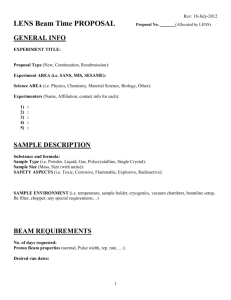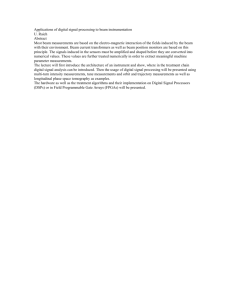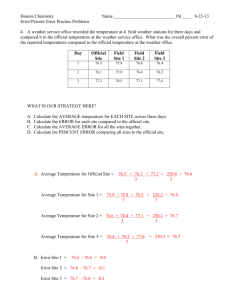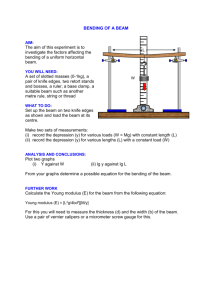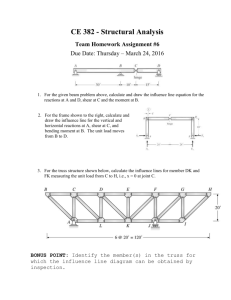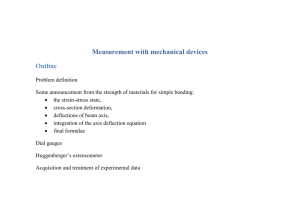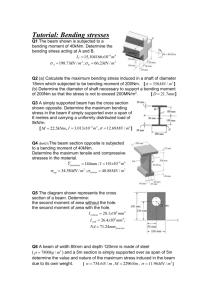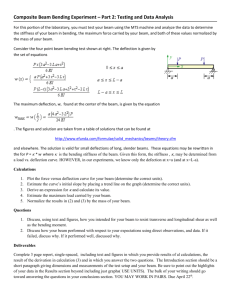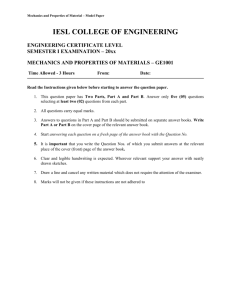Powerpoint
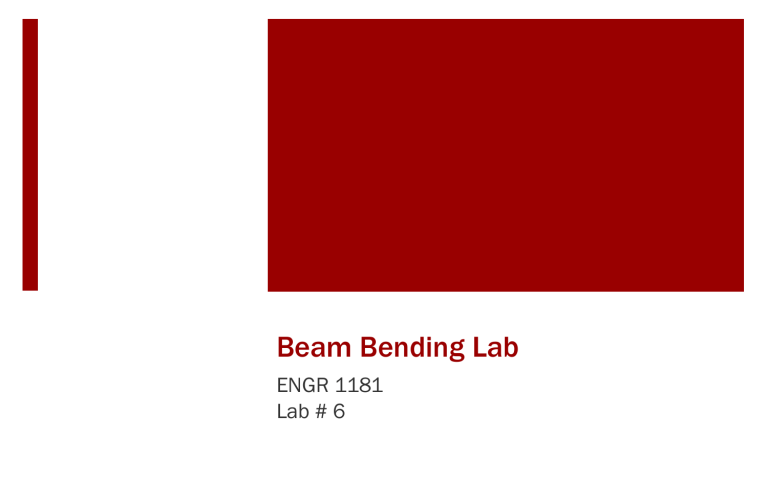
Beam Bending Lab
ENGR 1181
Lab # 6
Today's Learning Objectives
Students will develop techniques to measure the deflection of a cantilever beam using a dial caliper.
Students will calculate familiar calculations for and concepts regarding:
• Stress
• Strain
• Young’s Modulus of Elasticity
• Moment of Inertia
Beam Bending Lab Apparatus
Dial Indicator
Pulley
Vertical
Cantilever
Beam
Weight
Holder
Clamp
Extra
Weights
Beam Bending Lab Tasks
Your team is responsible for completing one lab memo.
During this lab, each group will divide into two groups to work more closely with the beam bending apparatus.
Measure Deflection (y-axis) versus Force (x-axis) for:
• Aluminum Rectangular Beam
• Copper Rectangular Beam
• Copper Square Beam
• “Unknown” Rectangular Beam
Typical Data and Results
Deflection vs. Force for Aluminum Beam
0,300
0,250
0,200
0,150
0,100
0,050
0,000
0,00 0,20 0,40 0,60 0,80 1,00
Force (Weight) applied to Beam (lbf)
1,20
Measured
Theory
Tips for Successful Lab
Make sure the beams are securely fastened, but without over-tightening.
Use dial caliper properly and follow instructions.
Make sure bezel is properly aligned.
Check numbers put in excel worksheet. Do they make sense?
Dial Indicator: Overview
This dial indicator is unloaded, and shows a reading of 0.989”, or -0.011”
(yours will be close). It is negative because the plunger is not engaged.
There is a locking screw in the upper right that should stay tightened.
The bezel (front adjustable ring) should not be moved. The black marker must always line up with the plunger.
Dial Indicator: Set-Up
When the beam is placed against the plunger (needle at bottom of picture), the dial should move and is then
“engaged”.
Your “zero weight” reading will not be exactly zero.
• It is a starting point for all other measurements to be compared.
Dial Indicator: Class Activity
What are these readings?
0.119” 0.282”
Important Takeaways
Using a dial caliper properly.
Do not rotate the bezel.
Apply the concept and formulas for stress, strain,
Young’s Modulus, and Moment of Inertia.
Think about how material and shape configuration impacts design decisions.
Preview of Next Lab
The next lab is a 2-part series involving Wind
Turbines.
This will familiarize students with wind turbine design, efficiency calculations, power generation, and creative design.
Prepare for Lab 7A by reading the Wind Turbine
Lab – Part A preparation material.
Topic
Marble Delivery System
Quality and Productivity
Circuits
Solar Meter
Solar Cell
Beam Bending
Wind Turbine 1
Wind Turbine 2
Problem Solving Project 1
Problem Solving Project 2
Problem Solving Project 3
Document Type
None
Executive Summary
Executive Summary
--
Memo (Combined)
Memo
--
Report (Combined)
Project Notebook
(Combined)
